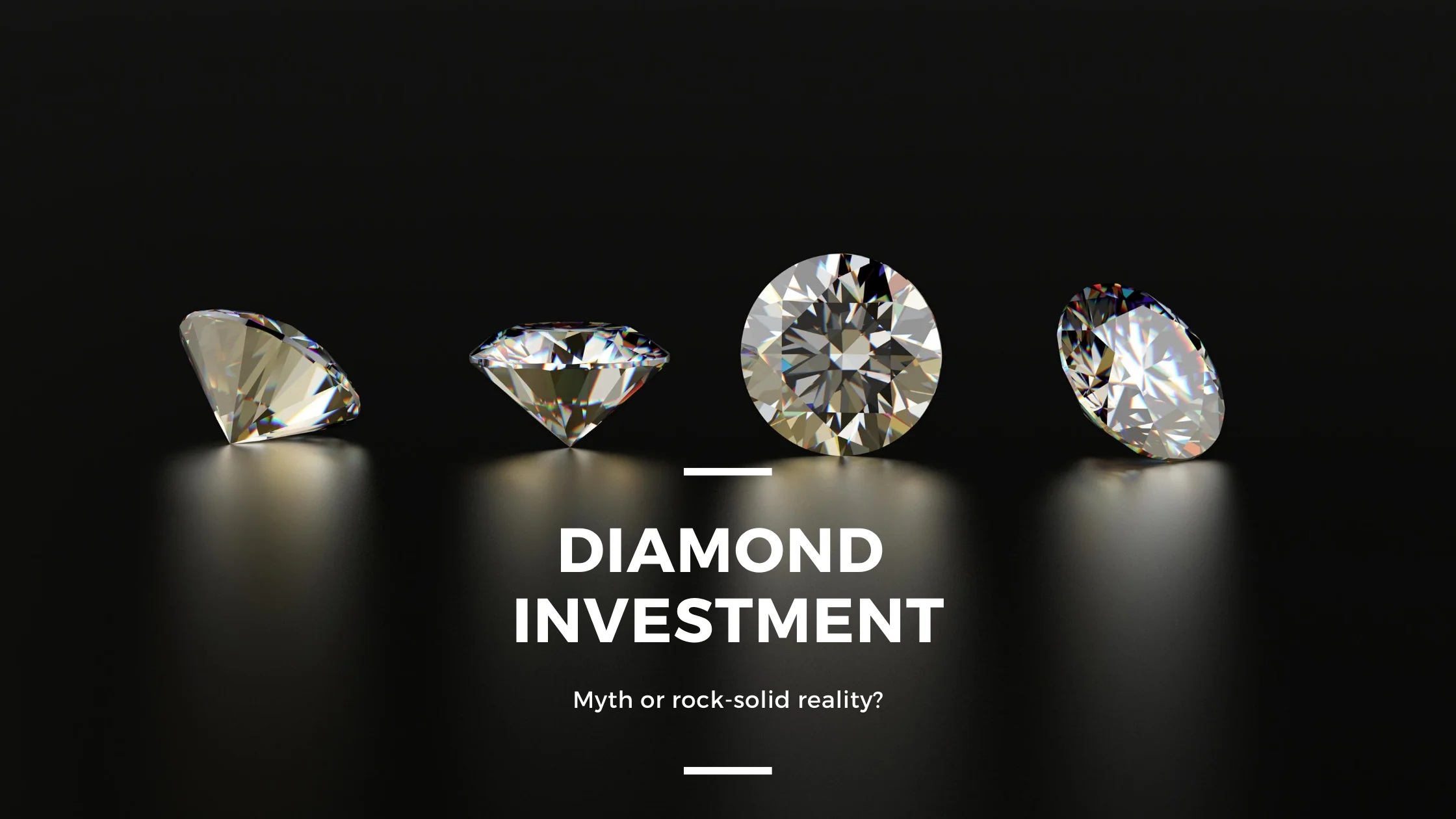Economy
Should I Invest in Diamond Jewelry?

Jewelry made of diamonds has long been seen as a representation of class, wealth, and unfading beauty. Many people are enticed by the idea of owning exquisite diamond pieces, whether it’s on a sparkling engagement ring or a dazzling necklace.
However, when it comes to investing in diamond jewelry, one might wonder if it is a wise financial decision. It is crucial to comprehend the variables that affect diamond jewelry’s worth before adopting it as a form of investment.
This article will answer the question, “Should I invest in diamond jewelry” by stating why you should buy diamond jewelry, and the reasons why investing in diamond jewelry is a good idea.
Additionally, this post will discuss the factors influencing the investment value of diamond jewelry, the risks associated with investing in diamond jewelry, and the things to do before investing in diamond jewelry, to enable you to make an informed decision.
Let’s dive into the details right away!
Why Buy Diamond Jewelry?
Buying diamond jewelry is a good investment because diamonds have a timeless appeal that makes them highly sought after in the world of jewelry. Their exquisite beauty, durability, and rarity contribute to their high value. Owning diamond jewelry allows you to enjoy not only the aesthetic pleasure it brings but also the potential investment returns it may offer.
Diamonds are considered a store of value and have historically held their worth over time. Unlike other luxury goods that may depreciate, well-maintained and high-quality diamond jewelry can retain or even appreciate.
Reasons Why You Should Invest in Diamond Jewelry
Here are several compelling reasons why diamond jewelry is an attractive investment option:
-
Diamond jewelry pieces are tangible and portable assets
Diamond jewelry is a tangible asset that you can physically possess and enjoy. Unlike other forms of investments that exist solely on paper or in digital form, diamond jewelry provides a sense of ownership and can be easily transported.
Check this catalog of mensweddingbands for a list of men’s wedding rings with gem engravings – like diamonds, which you can use for your engagement or wedding.
-
Diamond jewelry has a long-term value
Diamond jewelry has shown a history of long-term value appreciation. Over time, high-quality diamond jewelry has the potential to increase in value, especially those that possess exceptional characteristics such as large carat size, excellent cut, clarity, color, and unique designs.
-
High demand and desirability of diamond jewelry
Diamonds have a universal appeal and enduring demand. They are in demand for a variety of occasions, such as engagements, marriage ceremonies, anniversary celebrations, and many other events. The global demand for diamond jewelry ensures a robust market, which can positively influence the value of your investment.
-
Diamond jewelry holds emotional and sentimental value
Diamond jewelry holds emotional significance and sentimental value. People can pass it down through generations, symbolizing cherished memories, family traditions, and important milestones. The emotional value associated with diamond jewelry adds an intangible aspect that enhances its worth beyond monetary considerations.
-
Diamond jewelry pieces are rare and exclusive
The rarity and limited supply of high-quality diamond Jewelry contribute to their value. As the world’s diamond mines continue to deplete, the scarcity of these precious gemstones keeps driving up their prices.
-
Diamond jewelry is a means of wealth creation through portfolio diversification
Including diamond jewelry in your investment portfolio can contribute to diversification. Diamond jewelry is an alternative asset class that has historically exhibited a low correlation with other financial instruments such as stocks or bonds. Diversifying your investment by investing in diamond jewelry can help you to reduce risk and potentially enhance overall portfolio performance.
-
For personal pleasure
Unlike many other investments, diamond jewelry offers the opportunity for personal enjoyment. You can wear and showcase your investment, experiencing the beauty, elegance, and sophistication of diamonds firsthand.
Factors Influencing the Investment Value of Diamond Jewelry
Here are several key factors that influence the investment value of diamond jewelry;
Diamond scarcity
The rarity and scarcity of certain diamonds can drive up the value of diamond jewelry. Diamond jewelry pieces that possess exceptional qualities, such as large diamond carat sizes, flawless clarity, and vivid colors, are often highly sought after by collectors and investors.
Quality and craftsmanship of the diamond jewelry
The quality of a diamond, including its cut, clarity, color, and carat weight, plays a crucial role in determining the value of diamond jewelry. Additionally, the craftsmanship of the jewelry piece itself, including the design and setting, can enhance its desirability and worth.
Historical significance and provenance of the diamond jewelry
Diamond jewelry with historical significance or a notable provenance can hold significant value. Jewelry pieces worn by celebrities, royalties, or associated with important events often command higher prices due to their unique stories and cultural relevance.
Risks Involved in Investing in Diamond Jewelry
Even though diamond jewelry gives a good ROI (Return on Investment), it is vital to be aware of the risks involved in investing in them. Mentioned below are some of these risks:
The volatility of diamond jewelry prices
One risk involved in investing in diamond jewelry is price volatility. Due to a variety of circumstances, such as shifting dynamics between supply and demand, the state of the economy, and the market condition, the price of diamond jewelry might fluctuate. Bear that in mind before buying diamond jewelry for investment purposes.
Illiquidity and resale challenges
Compared to other investment assets, diamond jewelry can be relatively illiquid. Finding a buyer at the desired price and time may prove challenging. Additionally, the resale value of diamond jewelry may be lower than the original purchase price due to factors such as market conditions and changing consumer preferences.
Counterfeit diamond jewelry
The presence of counterfeit diamond jewelry in the market poses a risk to buyers. It is essential to purchase diamond jewelry from reputable sources and ensure proper certification to authenticate the diamonds’ quality and origin.
Steps to Take Before Buying Diamond Jewelry
To make an informed decision about investing in diamond jewelry, consider the following steps:
-
Consult with diamond jewelry experts
Seek guidance from reputable jewelers, gemologists, or financial advisors who specialize in diamond jewelry investments. Their knowledge can assist you in navigating the market’s complexity and selecting diamond jewelry wisely.
-
Conduct independent study and self-education
Take the time to educate yourself about diamond jewelry, its grading standards (4Cs), market trends, and the factors influencing its value. You can make more beneficial choices when purchasing diamond jewelry if you are well-informed and did your homework.
-
Create a spending budget
Come up with a spending budget that is in line with your financial objectives and risk tolerance. Determine the amount you are willing to invest in diamond jewelry without jeopardizing your overall financial well-being.
-
Establish personal preferences
Consider your or your partner’s (if you’re buying for her) personal preferences when selecting diamond jewelry. Investing in diamond jewelry that you genuinely appreciate and enjoy wearing can provide added value beyond financial returns.
FAQ
Can I sell diamond jewelry at a profit?
It is possible to sell diamond jewelry at a profit, but the resale value may be influenced by factors such as market conditions, the quality of the diamond on the jewelry, and consumer preferences. The timing and circumstances of the sale can also impact the potential profit.
Conclusion
Investing in diamond jewelry can be an alluring prospect, combining beauty, emotional value, and potential financial gains. However, it is crucial to approach diamond jewelry investments with careful consideration, research, and expert guidance.
By understanding the market dynamics, evaluating the quality and rarity of diamond jewelry, and assessing potential risks, you can make an informed decision when you want to invest in diamond jewelry.
Economy
CAC Deregisters 400,000 Inactive Businesses in 2025

By Adedapo Adesanya
The Corporate Affairs Commission (CAC) has deregistered more than 400,000 inactive companies from the corporate registry in 2025 as part of reforms aimed at strengthening transparency, protecting the economy and restoring investor confidence.
The Registrar-General of the CAC, Mr Hussaini Magaji, disclosed this on Saturday in Abuja during the commission’s monthly fitness walk, which was organised as part of the activities marking its 35th anniversary.
Mr Magaji said the affected entities were largely companies that had failed to file statutory annual returns for years and were no longer operational, warning that such firms posed serious risks to economic integrity.
He said, “In 2025 alone, we deregistered over 400,000 companies from our records. These were largely companies that had become inactive and failed to meet statutory obligations, including filing annual returns.
“Such entities pose threats to economic operations. Cleaning up the register was necessary to build confidence and ensure that Nigeria has a credible and reliable corporate registry,” he stated.
Mr Magaji explained that a transparent and up-to-date register was critical to attracting both local and foreign investment, as well as preventing the misuse of corporate structures for illicit activities.
The CAC boss described the anniversary fitness walk as symbolic, noting that it reflected the commission’s resilience, teamwork and institutional evolution since its establishment in 1991.
He recalled that the commission began operations as a largely manual agency, once confined to a single office in Garki, Abuja, but has since evolved into a fully digital, end-to-end service provider with global reach.
“The CAC has come a long way, from manual operations in one location to a fully digital organisation. Today, our services are available anywhere, anytime, 24/7. We are the only government agency providing end-to-end digital services,” he stated.
According to him, the commission’s digital transformation has significantly supported the Federal Government’s ease-of-doing-business reforms, eliminating the need for physical visits to CAC offices to register or manage businesses.
“You can register and manage your business from your room without stepping into any CAC office. That is what ease of doing business truly means,” he added.
As part of its support for small businesses, Mr Magaji disclosed that the commission partnered with the Small and Medium Enterprises Development Agency of Nigeria to facilitate the free registration of 250,000 MSMEs in 2025.
He explained that the registrations were deliberately channelled through SMEDAN to ensure beneficiaries also received training and capacity-building support, adding that improved welfare, timely payment of entitlements and clear career progression had boosted staff morale and service delivery.
Economy
NGX Market Cap Surpasses N110trn as FY 2025 Earnings Impress Investors

By Dipo Olowookere
Investors at the Nigerian Exchange (NGX) Limited have continued to show excitement for the full-year earnings of companies on the exchange so far.
On Friday, Customs Street further appreciated by 1.01 per cent as more organization released their financial statements for the 2025 fiscal year.
During the session, traders continued their selective trading strategy, with the energy sector going up by 2.47 per cent at the close of business despite profit-taking in the banking counter, which saw its index down by 0.11 per cent.
Yesterday, the insurance space grew by 2.16 per cent, the industrial goods segment expanded by 1.70 per cent, and the consumer goods industry jumped by 0.42 per cent.
Consequently, the All-Share Index (ASI) increased by 1,722.13 points to 171,727.49 points from 170,005.36 points, and the market capitalisation soared by N1.106 trillion to N110.235 trillion from the N109.129 trillion it ended on Thursday.
Business Post reports that there were 59 appreciating stocks and 19 depreciating stocks on Friday, representing a positive market breadth index and strong investor sentiment.
The trio of Omatek, Deap Capital, and NAHCO gained 10.00 per cent each to sell for N2.64, N6.82, and N136.40 apiece, as Zichis and Austin Laz appreciated by 9.98 per cent each to close at N6.72 and N5.40, respectively.
Conversely, The Initiates depreciated by 9.74 per cent to N19.45, DAAR Communications slumped by 7.32 per cent to N1.90, United Capital crashed by 6.55 per cent to N18.55, Coronation Insurance lost 5.71 per cent to quote at N3.30, and First Holdco shrank by 5.53 per cent to N47.00.
The activity chart showed an improvement in the activity level, with the trading volume, value, and number of deals up by 33.77 per cent, 93.27 per cent, and 10.63 per cent, respectively.
This was because traders transacted 953.8 million shares worth N43.1 billion in 51,005 deals compared with the 713.0 million shares valued at N22.3 billion traded in 46,104 deals a day earlier.
Fidelity Bank was the most active with 92.4 million units sold for N1.8 billion, Chams transacted 69.2 million units valued at N310.9 million, Deap Capital exchanged 59.1 million units worth N382.7 million, Access Holdings traded 57.2 million units valued at N1.3 billion, and Tantalizers transacted 48.6 million units worth N228.2 million.
Economy
Naira Retreats to N1,366.19/$1 After 13 Kobo Loss at Official Market

By Adedapo Adesanya
The value of the Naira contracted against the United States Dollar on Friday by 13 Kobo or 0.01 per cent to N1,366.19/$1 in the Nigerian Autonomous Foreign Exchange Market (NAFEX) from the previous day’s value of N1,366.06/$1.
According to data from the Central Bank of Nigeria (CBN), the Nigerian currency also depreciated against the Pound Sterling in the same market window yesterday by N2.37 to N1,857.75/£1 from the N1,855.38/£1 it was traded on Thursday, and further depleted against the Euro by 57 Kobo to close at N1,612.52/€1 versus the preceding session’s N1,611.95/€1.
In the same vein, the exchange rate for international transactions on the GTBank Naira card showed that the Naira lost N8 on the greenback yesterday to N1,383/$1 from the previous day’s N1,375/$1 and at the black market, the Nigerian currency maintained stability against the Dollar at N1,450/$1.
FX analysts anticipate this trend to persist, primarily influenced by increasing external reserves, renewed inflows of foreign portfolio investments, and a reduction in speculative demand.
In the short term, stability in the FX market is expected to continue, supported by policy interventions and improving market confidence.
Nigeria’s foreign reserves experienced an upward trajectory, increasing by $632.38 million within the week to $46.91 billion from $46.27 billion in the previous week.
The Dollar appreciation this week appears to be largely technical, serving as a correction to the substantial losses experienced from mid- to late January.
Meanwhile, the cryptocurrency market slightly appreciated, with Bitcoin (BTC) climbing near $68,000, up nearly 5 per cent since hitting $60,000 late on Thursday after investor confidence in crypto’s utility as a store of value, inflation hedge, and digital currency faltered.
The sell-off extended beyond crypto, with silver plunging 15 per cent and gold sliding more than 2 per cent. US stocks also fell.
The latest recoup saw the price of BTC up by 4.7 per cent to $67,978.96, as Ethereum (ETH) appreciated by 6.3 per cent to $2,021.10, and Ripple (XRP) surged by 9.5 per cent to $1.42.
In addition, Solana (SOL) grew by 7.3 per cent to $85.22, Cardano (ADA) added 6.1 per cent to trade at $0.2683, Dogecoin (DOGE) expanded by 5.4 per cent to $0.0958, Litecoin (LTC) rose by 5.2 per cent to $53.50, and Binance Coin (BNB) jumped by 2.3 per cent to $637.79, while the US Dollar Tether (USDT) and the US Dollar Coin (USDC) traded flat at $1.00 each.
-

 Feature/OPED6 years ago
Feature/OPED6 years agoDavos was Different this year
-
Travel/Tourism9 years ago
Lagos Seals Western Lodge Hotel In Ikorodu
-

 Showbiz3 years ago
Showbiz3 years agoEstranged Lover Releases Videos of Empress Njamah Bathing
-

 Banking8 years ago
Banking8 years agoSort Codes of GTBank Branches in Nigeria
-

 Economy3 years ago
Economy3 years agoSubsidy Removal: CNG at N130 Per Litre Cheaper Than Petrol—IPMAN
-

 Banking3 years ago
Banking3 years agoSort Codes of UBA Branches in Nigeria
-

 Banking3 years ago
Banking3 years agoFirst Bank Announces Planned Downtime
-

 Sports3 years ago
Sports3 years agoHighest Paid Nigerian Footballer – How Much Do Nigerian Footballers Earn











